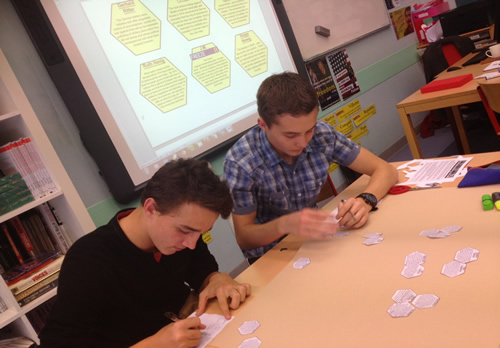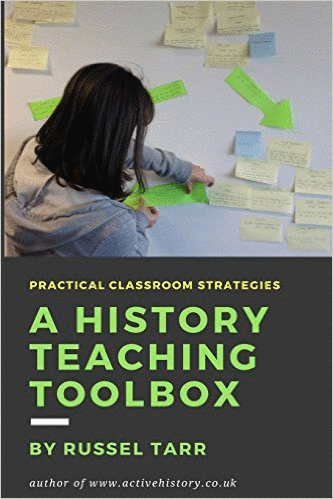Transform your history classroom
ActiveHistory provides educational, award-winning interactive simulations, decision-making games, self-marking quizzes, high-quality worksheets and detailed lesson plans for the school history classroom. All resources have been designed by full-time history teacher Russel Tarr.
An ActiveHistory subscription provides everything you need to construct and deliver a History course from start to finish for the entire 11-18 age range!
These consist not just of lesson plans, worksheets and teacher notes, but also multimedia lectures and interactive games and historical simulations ideal for remote learning and self-study.
World History teaching resources for the high school classroom: lesson plans, worksheets, quizzes and simulation games for KS3, IGCSE, IB and A-Level teachers.
What Caused the First World War?
Note: Full and comprehensive teaching materials for this topic can be found on the ActiveHistory section for this topic
From the syllabus
Focus Points
Did the Alliance System make war more or less likely?
How far did colonial problems create tensions between the Great Powers?
Why were problems in the Balkans so difficult for the Great Powers to solve?
How did the assassination of Franz Ferdinand lead to war?
Specified Content
The origins of the First World War, 1890-1914
The Alliance System, Colonial Rivalries, developments in the Balkans, the crisis of June-July 1914 and the outbreak of war.
Past Questions
| 2016 Nov (region 3) | 2016 Nov (region 2) | 2016 Nov (region 1) | 2016 June (region 3) | 2016 P1 June (region 2) | 2016 P1 June (region 1) | 2015 Sample paper 1 | ||
| Causes of World War One | a [4 marks] | What part did Germany play in naval rivalry with the British? | Describe the Kaiser’s actions which contributed to rising European tension by 1908. |
What actions did the Kaiser take between 1896 and 1902 that convinced Britain that Germany was becoming a threat? |
Describe the Agadir Crisis of 1911. | Describe the part played by Germany in the arms race in the early years of the twentieth century. |
||
| b [6 marks] | Why were events in Morocco responsible for increasing tension between Germany, Britain and France? |
Why were the Balkans unstable in the years leading to the First World War? |
Why did Germany want an overseas empire? |
Why was the Algeciras Conference of 1906 a disaster for the Kaiser? |
Why did the actions of Austria-Hungary in 1908 increase international tension? |
|||
| c [10 marks] | ‘The actions of Serbia brought war in 1914.’ How far do you agree with this statement? | ‘The Alliance System was the major cause of war in 1914.’ How far do you agree with this statement? | ‘The Moroccan Crisis of 1905–06 was more responsible for raising tension among the Great Powers than was the Moroccan Crisis of 1911.’ How far do you agree with this statement? | ‘Russia was more to blame for war in 1914 than any other country.’ How far do you agree with this statement? | ‘By 1914, the Triple Alliance was stronger than the Triple Entente.’ How far do you agree with this statement? |
Classroom activities
Interactive Essay Planning Tool: Origins of World War One [free]
Professor AJP Sailor takes 5 factors and connects them together in endless combinations to help students consider the Origins of World War One and how to link factors in essays.
Mr. Men History: The Origins of World War One
"In this task we will convert the story of the outbreak of the war into a fairy tale. The background will be provided to you. Your job will be to tell the story of how events unfolded using your knowledge of key events".
Historiography: Quotes about the Origins of World War One
"A. For each quote, decide which theme it relates to:
1. Nationalism and Imperialism | 2. Alliance System | 3. Arms Race | 4. Colonial Rivalry | 5. July Crisis
B. Circle off the best quote for each theme. Incorporate this into your revision notes".
Historiography through events management: Design a Seating Plan for these 18 Historians!
"Here are 18 historians with different viewpoints about the Origins of World War One. Your job is to cut up these cards, read each one carefully, and arrange a dinner party reception designed to ensure that nobody ends up sitting adjacent to anybody that they will argue with too much, but will instead sit adjacent next to somebody or several people that they broadly agree with! Work alone at first, then compare your ideas with a partner and with the class. Stick down your cards on sugar paper when you are happy with your seating plan, and provide a key to explain why each "table" has been arranged in that particular way".
Discussion points: (a) Where would you seat yourself, and why? (b) If a fight was to break out between two tables of people - or two key individuals - which would they be, and why?
Interactive Revision Quizzes
Fling the Teacher Quiz

Ideal for a starter activity. Outline the main task for the day at the beginning of the lesson. Then, give students 10 minutes to play the game. Anyone finishing within the 10 minutes should get points reflecting the amount of minutes left on the clock, then move directly on to the main task for the lesson whilst the rest of the class continue to play.
Repeat this format for ALL your revision lessons to create a "Revision Leaderboard" with a prize given to the overall high score at the end of revision time.
[free]
Origins of World War One: Keyword challenge
Put students into teams of 4 or 5. The first member of the first team sits in the "hotseat" with their back to the interactive whiteboard. The teacher uses the "Random Word Picker" at www.classtools.net to choose and display a word at random on the interactive whiteboard. The rest of the team have 30 seconds to get their teammate to guess what word is on the screen behind them by giving a definition. A correct guess gets points for the team based on how many seconds are left on the clock (e.g. 25 points if they get it after 5 seconds). The teacher should then provide a short outline of the significance of the term, and all students should make a note of it. Repeat for the other teams, and carry on for as many rounds as you like! A prize can be given to the highest-scoring team at the end of the game, and scores can be added to the Revision Leaderboard if you are using one.[free]
"Who Am I?" Challenge - The Origins of World War One [free]
Each team will be presented with a clue about a key historical figure. They get 50 points if they guess it correctly. If they wish to 'pass', they get further (easier) clues but the points available steadily decline. An incorrect guess at any point means they get zero points for that round. You can play as many rounds as you wish. It's a great way to revise!
Interactive Simulation
You are the Kaiser! [free]
At this halfway stage, students should play the simulation for the first time. It is recommended that they complete the gap-fill chronology exercise worksheet on this occasion. The game is complete with a range of differentiated worksheets, this decision-making adventure really gets students thinking about the important people, themes and events.
IGCSE Revision: Homepage

© 1998-2025 Russel Tarr, ActiveHistory.co.uk Limited (Reg. 6111680)
1 Torrin Drive, Shrewsbury, Shropshire, SY3 6AW, England
Privacy Policy | Contact








